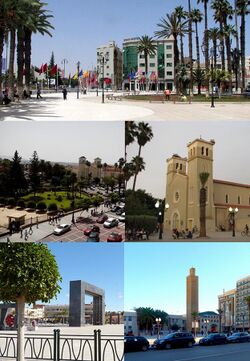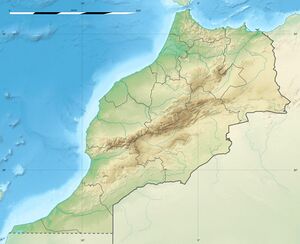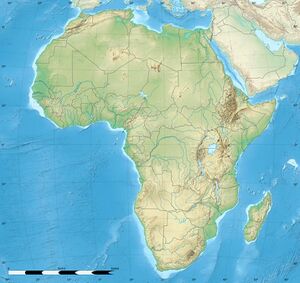Place:Oujda
Oujda
| |
|---|---|
City | |
 | |
| Coordinates: [ ⚑ ] 34°41′21″N 1°54′41″W / 34.68917°N 1.91139°W | |
| Country | Morocco |
| Region | Oriental |
| Modern city | 994 |
| Area | |
| • Total | 96.4 km2 (37.2 sq mi) |
| Elevation | 470 m (1,540 ft) |
| Population | |
| • Total | 558,000 |
| • Rank | 8th in Morocco |
| • Density | 5,800/km2 (15,000/sq mi) |
| Time zone | UTC+1 (CET) |
Oujda (Arabic: وجدة; Berber languages: ⵡⵓⵊⴷⴰ, romanized: Wujda) is a major Moroccan city in its northeast near the border with Algeria. Oujda is the capital city of the Oriental region of northeastern Morocco and has a population of about 558,000 people. It is located about 15 kilometres (9 miles) west of the Moroccan-Algerian border in the south of the Beni-Znassen (Aït Iznassen) Mountains and about 55 km (34 miles) south of the Mediterranean Sea coast.
History

Origins
There is some evidence of a settlement during the Roman occupation, which seems to have been under the control of Berbers rather than Romans.[2]
The city was founded in 994 by Ziri ibn Atiyya, Berber chief of the Zenata Maghrawa tribe. Ziri was, with his tribe, authorized to occupy the region of Fas, but feeling insecure in that region and that town, and wishing to be nearer to the central Maghrib homeland of his tribe, he moved to Ouajda, installed there a garrison and his possessions, appointing one of his relatives as governor.[3]
11th to 19th centuries
In the mid-11th century, a new quarter with a wall was allegedly added to the primitive core. Yusuf ibn Tashfin occupied the city in 1079, and in the next century, it came under Almohad control, with its fortifications repaired and strengthened under the Almohad caliph Muhammad al-Nasir.[3]
Oujda played an important strategic role between the Marinids, based in Fes, and the Abdalwadids of the Kingdom of Tlemcen.[3] The Marinid sultan Abu Yusuf Yaqub destroyed the city when he defeated Sultan Yaghmorasan in 1271. When his successor Abu Yaqub Yusuf conquered the city again in 1296, he destroyed the remaining fortifications but then rebuilt the town with the new walls, a palace, and a Great Mosque (the current one). The town continued to change hands, however. Around 1325, Sultan Abu al-Hasan took the city again during a series of campaigns which extended Marinid control into the central Maghreb for a brief period.[3]
Because of its frontier position, the city was frequently contested between the Sharifian dynasties of Morocco – the Saadis, followed by the Alaouites – to the west and the Ottoman Empire to the east, from the 16th century onward.[3] It was often attached to the province or region of Tlemcen, which itself also changed hands several times in this period. During the long reign of Moulay Isma'il (1672–1727), Oujda was firmly under Alaouite control and defended by new fortifications and garrisons built by the sultan. After Isma'il's death, however, political instability returned. It was only in 1795 that the city was retaken by the Alaouite empire and permanently incorporated into Morocco.[3]
The French occupied it in 1844 and again in 1859. To the west of the city is the site of the Battle of Isly which occurred in 1844. In 1907-1908, Oujda was reconquered by General Bugeaud and Marshal Lyautey and used as a French military base to control eastern Morocco. The modern city owes much of its present form to the French, who developed along the roads built at that time.[citation needed]
20th century and present day
Anti-Jewish riots occurred in Oujda June 1948, during the 1948 Palestine war in the aftermath of the establishment of the State of Israel.[4]: 151 Oujda, located near the border, was a departure point for Moroccan Jews seeking to reach Israel by crossing into French Algeria; at the time they were not permitted to do so from within Morocco.[4]: 151 In the events, 47 Jews and a French person were killed, many were injured, and property was damaged.[4]: 151
The 1953 Oujda revolt took place during Thami El Glaoui's attempted coup against Sultan Muhammad V.[5]
In 1954, from the beginning of the Algerian Independence War, Morocco allowed Oujda to become the logistic center of the Oujda Group.[citation needed]
The Moroccan border with Algeria is just east of Oujda; on the other side of the border is the Algerian town of Maghnia. The border has been closed since 1994.[6]
In 2010, Rod Solaimani chronicled his trip to Oujda for MTV.
Geography
The city is located 60 km (37 mi) south of the Mediterranean sea and 15 km (9 mi) west of Algeria, with an estimated altitude of 450 metres (1,476 feet).
5 km (3 mi) south from city centre, is Jbel Hamra, a typical Mediterranean forest and into the east of this forest is Sidi Maafa park.
Oujda is located in the south of Beni Znassen mountains.
Climate
The city has a cold semi-arid climate (Köppen climate classification BSk). Rainfall is between 300 mm (11.8 in) and 500 mm (19.7 in) per year. It rarely snows in winter; last snowfall was on 5 February 2012. Weather in Oujda is cool but still tepid and wet in winter, hot and dry in summer.
Script error: No such module "weather box".
Architecture


The main characteristic of the city is having the old city in the centre. The old city maintains traditional features of the Moroccan architecture with its narrow, winding alleys which lead to the houses and markets such as the jewelry market and the leather market. The Grand Mosque of Oujda is one of its historically most important mosques.
Bled el Gaada is a Roman era ruins just outside of Ouijda.[citation needed] The ruins consist of a Roman Castra fort 175m by 210m.[12]
Music
Gharnati refers to a variety of music originating in Andalusia. Its name was derived from the Arabic name of the Spanish city of Granada. Gharnati constitutes the musical mode mostly used in Oujda, where besides this musical kind is omnipresent and where each year in June the International Festival of Gharnati music is held.
Reggada Music is a major traditional music movement. Its a Moroccan Amazigh ancient musical genre and traditional war dance from the Beni Znassen/Aït Iznasen tribes of north-east Morocco (Provinces of Oujda, Berkane and Taourirt), more precisely coming from the village called Ain-Reggada. This dance used to celebrate and emulate victory of a battle. This music has now become part of the global music sphere.[citation needed]
Oujda is also famous by the music of Raï.
Subdivisions
The province is divided administratively into the following:[13]
| Name | Geographic code | Type | Households | Population (2004) | Foreign population | Moroccan population | Notes |
|---|---|---|---|---|---|---|---|
| Bni Drar | 411.01.11. | Municipality | 1648 | 8919 | 57 | 8862 | |
| Naïma | 411.01.19. | Municipality | 218 | 1151 | 0 | 1151 | |
| Oujda | 411.01.23. | Municipality | 82128 | 400738 | 2700 | 398038 | |
| Ahl Angad | 411.07.01. | Rural commune | 2897 | 16494 | 113 | 16381 | |
| Ain Sfa | 411.07.03. | Rural commune | 837 | 5082 | 5 | 5077 | |
| Bni Khaled | 411.07.05. | Rural commune | 1231 | 7104 | 30 | 7074 | |
| Bsara | 411.07.07. | Rural commune | 317 | 1922 | 1 | 1921 | |
| Isly | 411.07.09. | Rural commune | 4262 | 23896 | 24 | 23872 | |
| Mestferki | 411.07.11. | Rural commune | 797 | 4832 | 0 | 4832 | |
| Sidi Boulenouar | 411.07.17. | Rural commune | 516 | 3526 | 0 | 3526 | |
| Sidi Moussa Lemhaya | 411.07.19. | Rural commune | 563 | 3436 | 0 | 3436 |
Transport
Tourists aiming at Saïdia, bordering the Mediterranean, transit to Oujda's airport. The city is served by Angads Airport, which has connecting international flights to Lisbon, Brussels, Madrid, Marseille or Paris for example, as well as domestic flights to Casablanca.
The city is the endpoint of the main railroad from Casablanca via Fes and Taourirt before the border with Algeria. There are several day and night trains to and from the city, linking it to the western part of the country.
The Oriental Desert Express was originally built in the 1920s and 1930s as part of the Mediterranean–Niger Railway. One of its cars, the historical "prince's wagon" passenger car runs now twice annually. Outside camera shots of the Oriental Desert Express were featured in the 2015 James Bond film Spectre.[14]
Economy
Oujda has a strategic importance because of its location on the border. There are many economic and natural resources, however, problems of overpopulation of the city and increase in unemployment rate up to 18% of the 11% on the national level has led to migration to foreign countries go up to 28.3% of the national total.
Oujda relies heavily on trading given its location near the borders of Algeria. The economy of the city is directly related to the border's condition as it represents a passage for businesses directed towards Fes in the west, Talmasan in the east, Figuig in the south and Melilla in the north.
On 18 March 2003, King Mohammed VI indicated the importance of reviving the economy of the Eastern regions of Morocco. In the context of this effort, Technopol Oujda was established and the region witnessed road improvement, airport expansion and other projects.
Sport
The sports infrastructure in Oujda is composed of a municipal stadium, an Olympic venue, the Honneur Stadium of Oujda, built in 1976, the sports complex 'Rock' including a rugby stadium, a complex tennis in the park Lala Aicha, a golf course and two sports halls.
Football
In 1957, MC Oujda (MCO) became the first football club to win the Throne Cup of Morocco, defeating the Wydad of Casablanca, a feat the club repeated the following year. In 1959, in its third successive appearance in the final, the club lost against FAR of Rabat. However, in MC Oujda's fourth successive final, the club defeated FUS Rabat. In 1962 MCO won its last Throne cup against the Kawkab Athletic Club of Marrakech.[15]
After ten years, MC Oujda came back to win in 1972 the Maghreb Cup,[citation needed] three years after it won The Botola Pro of Morocco.[16]
US Musulmane d'Oujda, is another football club in Oujda.
Notable people
Arts & Cinema
- Hafid Bouazza – Writer
- Hamid Bouchnak – Moroccan raï singer and songwriter
- Nathalie Delon – Actress and director
- Douzi – Singer and songwriter
- Les Freres Megri – Rock band very popular in the Arab world, composers and producers.
- Philippe Faucon – Filmmaker
- Fouad Laroui – Writer and economist
- Michel Qissi – Actor
- Mimoun El Oujdi – Raï singer
- Younes Megri – Actor, singer author of 'Leli Touil' sung by Maria de Rossi & Boney M.
- Abdelkrim Derkaoui – Cinematographer, film director and screenwriter
- Bassouar Al Maghnaoui – Singer
- Simon Basinger – Musicologist, essayist, producer and author.
- Charlotte Slovack – Filmmaker
- Douzi – Pop singer
- Serge Guirao – Singer
Sports
- Adil Belgaid – Olympic judo fighter (3 times World Champion, 6 times African Champion, 3 times Arab Champion, 3 times Olympian)
- Abdelatif Benazzi – Rugby player
- Philippe Casado – Cyclist
- Abdelkarim Kissi – Footballer
- Soufiane Kourdou – Professional basketball player
- Moha Rharsalla – Footballer
- Mohammed Qissi – Actor (Kickboxer, Bloodsport with Jean Claude Vandamme)
- Mohcin Cheaouri – Track and Field athlete, 2 times African champion
- Yahya Berrabah – Olympic athlete, African champion in long jump
- Daniel Sanchez – Footballer
- Gilles Simon – Formula 1
- Ahmed Belkedroussi – Football manager
- Khadfi Rharsallah – Footballer
- Marianne Agulhon – Slalom canoeist
- Mohammed Berrabeh – International footballer
- Hassan Alla – Footballer
- Mohammed Ben Brahim – Footballer
- Khalid Chalqi – Footballer
- Gerard Soler – Footballer midfielder
- Khalid Lebji – Footballer midfielder
- Abou El Kacem Hadji – Footballer
- Ryad El Alami – Footballer
- Abdelah Kafifi – Footballer
- Mohamed Atmani – Boxer (Summer Olympics)
- Soufiane Kourdou – Basketball player
- Houssam Amaanan – Footballer
- Habib Allah Dahmani – Footballer
Politics & Diplomats
- Ahmed Osman – Former Prime Minister, married King Hassan II's sister, Lalla Nuzha of Morocco
- Zoulikha Nasri – Advisor to King Mohammed IV, MD of foundation 'Mohammed V for Solidarity'
- Muhammad Ben Abdessalam Al Muqri – Late 19th senior official, advisor and grand vizier to several sultans.
- Abdelkader Lecheheb – Football player and Ambassador to Russia
- Mohamed Allal Sinaceur – Former Minister of Cultural Affairs
- Mohamed Habib Sinaceur – Politician
- Ahmed Toufiq Hejira – Former Minister of Housing and Urbanism
- Kaddour El Ouartassi – Historian
- Najima Rhozali – Politician, professor
- Yvette Katan Bensamoun – Historian
- Omar Benjelloun – Journalist
- Abdelaziz Bouteflika – (1937–2021), 5th President of Algeria
- Abdelnour Abbrous – Politician
- Chakib Khelil – Politician
- Hassnae Bouazza – Journalist, writer, columnist
- Louisette Ighilariz – Politician
Business
- Maurice Levy – French businessman, Chairman of Publicis Group.
Town twinning
 Trowbridge, UK, (2009)[17] Trowbridge has the largest Moroccan community in the UK outside London, and is the first UK town to be twinned with a place from a Muslim country. At the time, Trowbridge had approximately 80 resident families who had roots in Oujda.[18]
Trowbridge, UK, (2009)[17] Trowbridge has the largest Moroccan community in the UK outside London, and is the first UK town to be twinned with a place from a Muslim country. At the time, Trowbridge had approximately 80 resident families who had roots in Oujda.[18] Lille, France
Lille, France Sevran, France
Sevran, France Jouy-le-Moutier, France
Jouy-le-Moutier, France Aix-en-Provence, France (2007)
Aix-en-Provence, France (2007) Jeddah, Saudi Arabia
Jeddah, Saudi Arabia Sirte, Libya
Sirte, Libya Oran, Algeria
Oran, Algeria Sint-Jans-Molenbeek, Belgium
Sint-Jans-Molenbeek, Belgium
See also
- Oujda group – an Algerian political faction named after the town
- Capture of Oujda (1647)
References
- ↑ "POPULATION LÉGALE DES RÉGIONS, PROVINCES, PRÉFECTURES, MUNICIPALITÉS, ARRONDISSEMENTS ET COMMUNES DU ROYAUME D'APRÈS LES RÉSULTATS DU RGPH 2014" (in ar, fr). High Commission for Planning, Morocco. 8 April 2015. http://rgph2014.hcp.ma/file/166326/.
- ↑ Siraj, Ahmed (1995-01-01) (in fr). L'image de la Tingitane: l'historiographie arabe médiévale et l'antiquité nord-africaine. Boccard. pp. 589–595. ISBN 9782728303175. https://books.google.com/books?id=oypmAAAAMAAJ.
- ↑ 3.0 3.1 3.2 3.3 3.4 3.5 Marçais, G.; Troin, J.F. (2002). "Wad̲j̲da". in Bearman, P.; Bianquis, Th.; Bosworth, C.E. et al.. Encyclopaedia of Islam. XI (2nd ed.). Leiden, Netherlands: Brill Publishers. pp. 23–24. ISBN 9004081143. http://referenceworks.brillonline.com/entries/encyclopaedia-of-islam-2/wadjda-COM_1325.
- ↑ 4.0 4.1 4.2 Gottreich, Emily (2020). Jewish Morocco. I.B. Tauris. pp. 10. doi:10.5040/9781838603601. ISBN 978-1-78076-849-6. http://dx.doi.org/10.5040/9781838603601.
- ↑ "Quatre-vingt-seize Marocains poursuivis pour participation à la « tuerie d'Oujda », qui fit trente morts le 16 août 1953, passent en jugement" (in fr). Le Monde.fr. 1954-11-30. https://www.lemonde.fr/archives/article/1954/11/30/quatre-vingt-seize-marocains-poursuivis-pour-participation-a-la-tuerie-qui-fit-le-16-aout-1953-trente-morts-a-oujda-passent-en-jugement_2026822_1819218.html.
- ↑ "Letter from Africa: Lamenting the Algeria-Morocco border closure" (in en-GB). BBC News. 2021-07-04. https://www.bbc.com/news/world-africa-57467644.
- ↑ "Oujda Climate Normals for 1991–2020". World Meteorological Organization. https://www.nodc.noaa.gov/archive/arc0216/0253808/1.1/data/0-data/Region-1-WMO-Normals-9120/Morocco/CSV/OUJDA_60115.csv.
- ↑ "World Meteorological Organization Climate Normals for 1981–2010". National Oceanic and Atmospheric Administration. https://www.ncei.noaa.gov/pub/data/normals/WMO/1981-2010/RA-I/Morocco/WMO_Normals_ASCII_60115.csv.
- ↑ "Klimatafel von Oujda / Marokko" (in de). Baseline climate means (1961–1990) from stations all over the world. Deutscher Wetterdienst. http://www.dwd.de/DWD/klima/beratung/ak/ak_601150_kt.pdf.
- ↑ "Station Oujda" (in fr). Météo Climat. http://meteo-climat-bzh.dyndns.org/index.php?page=stati&id=755.
- ↑ "60115: Oujda (Morocco)". OGIMET. 11 July 2021. https://www.ogimet.com/cgi-bin/gsynres?ind=60115&ano=2021&mes=7&day=12&hora=0&min=0&ndays=30.
- ↑ MacKendrick, Paul Lachlan (2000) (in en). The North African Stones Speak. University of North Carolina Press. pp. 312. ISBN 978-0-8078-4942-2. https://books.google.com/books?id=rH26vL2CWbkC&dq=Bled+el+Gaada+roman&pg=PA414.
- ↑ "Recensement général de la population et de l'habitat de 2004". Haut-commissariat au Plan, Lavieeco.com. http://www.lavieeco.com/documents_officiels/Recensement%20population.pdf.
- ↑ "Morocco tourists make tracks on 007's 'desert express'" (in en). 21 September 2017. https://www.dw.com/en/bonds-desert-express-for-morocco-tourists/a-40604541.
- ↑ Winners of the Throne Cup of Morocco
- ↑ Winners of the football League of Morocco
- ↑ "Trowbridge - Market town twins with Arab city". BBC News (BBC News Channel). 2006-10-03. http://news.bbc.co.uk/1/hi/england/wiltshire/5401592.stm.
- ↑ "Trowbridge plans Moroccan link-up" (in en). https://www.gazetteandherald.co.uk/news/7417417.trowbridge-plans-moroccan-link-up/.
External links
[ ⚑ ] 34°41′12″N 01°54′41″W / 34.68667°N 1.91139°W
 |



